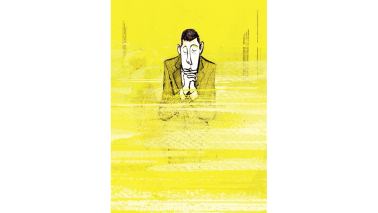Is it really a six-figure salary? Only, this time last year it wouldn’t have seemed worth it, but now it’s looking almost as attractive as a job in the public sector. I think I might have to go for it. ‘Step up to the plate,’ as I must learn to say, if I’m to stand any chance whatsoever. There’s a place going spare at the moment, too, so it’s not totally unfeasible. I could actually be Sir Alan’s new Apprentice.
Then again, no. For a man of such tremendous supposed business acumen and shrewd character judgment, Sir Alan has never been much cop at picking the right candidate. He’s unhealthily drawn to spivvy chancers like Michael Sophocles, and rough diamonds like the CV-tweaking Neanderthal who won the last series. Also, given his hard-man image, he’s surprisingly vulnerable to a bit of Dickensian sentiment, which is why he gave the series-before-last to that drippy, slightly creepy, but with-a-great-back-story Michelle girl rather than the infinitely more meritorious Ruth Badger.
Tell you who I think should win this new series: Mona Lewis. She’s from Tanzania but, on first showing, she comes across like somebody you’d choose because she was actually good rather than simply because she was black and female. I didn’t like her pushy negotiating technique — almost lecturing her customer on how grateful he ought to be that her car-cleaning rates were so abnormally high — but unfortunately this is pretty much de rigueur for successful Apprentice candidates. But I did very much like her performance in the boardroom after her team had lost.
The reason her team lost was, basically, because three girls in one of her sub-teams had proved so crap at cleaning cars they didn’t get the full contract and lost out on £100 of business. Debra, the head of that sub-team, had told Mona on her mobile that her girls were rubbish. But then in the boardroom, shifty Debra denied this and tried laying the blame elsewhere. Mona wasn’t taking this nonsense and, looking the very picture of wounded decency, stood up for the unlikely cause of truth and honour in business.
One of the things I both love and hate about The Apprentice — and the reason we keep watching, I suppose — is that, like real life, it’s so terribly random and unfair. In most of the challenges, it’s a complete matter of luck who wins and who loses. So while the winners swan off to enjoy the cocktail session/helicopter trip/slap-up meal they’ve barely earned, the losers end up being hauled over the coals and made to feel like utter criminals for having adopted strategies which, but for unhappy accident, could so easily have made them the winning team.
This means that the key to surviving The Apprentice is not so much to be talented or a natural winner as it is to be expert at damage limitation, face-saving and buck-passing. It is, in other words, the very exemplar of those business characteristics responsible for dragging the world into the current depression. I wonder how audiences will respond to this.
Dispatches (Channel 4, Monday) conducted a survey into the parlous state of nursing in the wake of the Staffordshire hospital scandal. It emerged — not that we didn’t know already — that 55 per cent of nurses have either shouted at a patient or seen another nurse doing so; and that hospital wards at night are like ships of the damned, with desperate patients wandering corridors in search of help.
Sure, nurses need to be paid a proper wage. But none of this would have come to pass if wards were still run according to the traditional military-style hierarchy of matrons and sisters, and if the nursing profession was still about the honourable profession of nursing, rather than a half-way house for girls too thick to be doctors but too snooty and ‘qualified’ to do anything so menial as care for patients mired in their own filth. q






Comments